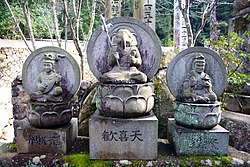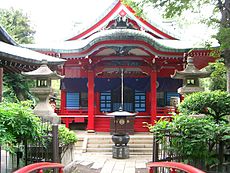| Revision as of 08:36, 31 July 2023 editWoodElf (talk | contribs)Extended confirmed users, Pending changes reviewers3,942 edits →Present: updated informationTag: 2017 wikitext editor← Previous edit | Revision as of 16:48, 3 September 2023 edit undoWoodElf (talk | contribs)Extended confirmed users, Pending changes reviewers3,942 edits reworked confusing paraagraphTag: 2017 wikitext editorNext edit → | ||
| Line 9: | Line 9: | ||
| }} | }} | ||
| {{Hinduism by country}} | {{Hinduism by country}} | ||
| ] is a minority religion in |
] is a minority ] mainly followed by the ] and ] ] residents of Japan, who number about 166,550 people as of 2022. | ||
| ==Cultural== | ==Cultural background== | ||
| ] ]] | ] ]] | ||
| Although Hinduism is a little-practiced religion in Japan, it has still had a significant, but indirect role in the formation of Japanese culture. This is mostly because many Buddhist beliefs and traditions (which share a common Indian root with Hinduism) spread to Japan from China via ] in the 6th century. One indication of this is the Japanese "Seven Gods of Fortune", of which four originated as Hindu deities: ]sama (]), Bishamon (Vaiśravaṇa or Kubera), ] (] |
Although Hinduism is a little-practiced religion in Japan, it has still had a significant, but indirect, role in the formation of Japanese culture. This is mostly because many Buddhist beliefs and traditions (which share a common Indian root with Hinduism) spread to Japan from China via ] in the 6th century. One indication of this is the Japanese "Seven Gods of Fortune", of which four originated as Hindu deities: ]sama (]), Bishamon (Vaiśravaṇa or ]), ] (] or ]), and ] (]). The last, along with ]nyo (]) and ] completes the ] ] of Great Goddesses.<ref name="Butsuzōzui">{{cite web|title=Butsuzōzui (Illustrated Compendium of Buddhist Images)|url=http://www.lib.ehime-u.ac.jp/SUZUKA/316/index.html|location=Ehime University Library|page=(059.jpg)|language=Japanese|format=digital photos|date=1796}}</ref> | ||
| Benzaiten arrived in Japan during the 6th through 8th centuries, mainly via the ] translations of the '']'' (金光明経), which has a section devoted to her. She is also mentioned in the ]. |
Benzaiten arrived in Japan during the 6th through 8th centuries, mainly via the ] translations of the '']'' (金光明経), which has a section devoted to her. She is also mentioned in the ]. In Japan, the ] take the Buddhist form of the ] (四天王). The Sutra of Golden Light became one of the most important ]s in ] because of its fundamental message, which teaches that the Four Heavenly Kings protect the ruler who governs his country in the proper manner. The Hindu god of death, ], is known in his Buddhist form as ]. ], the mount (]) of ], is known as the ] (迦楼羅), an enormous, fire-breathing creature in Japan. It has the body of a human and the face or beak of an ]. ] originated from the ]. ] (or ]) is prayed to for health, success and good fortune. Many ] (or ''Tenbu'') have their roots in Hinduism and are still revered by many Japanese particularly in ]. Other examples of Hindu influence on Japan include the belief of "six schools" or "six doctrines" as well as use of ] and ]. Many of the facets of Hindu culture which have influenced Japan have also ]. | ||
| People have written books on the worship of Hindu gods in Japan.<ref>Chaudhuri, Saroj Kumar. Hindu Gods and Goddesses in Japan. (New Delhi, 2003) {{ISBN|81-7936-009-1}}.</ref> Even today, it is claimed Japan encourages a deeper study of Hindu Gods.<ref> |
People have written books on the worship of Hindu gods in Japan.<ref>Chaudhuri, Saroj Kumar. Hindu Gods and Goddesses in Japan. (New Delhi, 2003) {{ISBN|81-7936-009-1}}.</ref> Even today, it is claimed Japan encourages a deeper study of Hindu Gods.<ref>{{Cite web |last=Mohapatra |first=Satyen |date=2023-09-03 |title=Japan Wants to Encourage Studies of Hindu Gods |url=https://pluralism.org/news/japan-wants-encourage-studies-hindu-gods |website=The Pluralism Project, Harvard University}}</ref> | ||
| ⚫ | ==Present situation== | ||
| ⚫ | Hinduism is practiced mainly by the Indian and Nepali migrants, although there are others. As of 2022, there are 40,752 ]<ref name="toukei_ichiran_touroku"></ref><ref>{{cite news|url=https://www.e-stat.go.jp/stat-search/files?page=1&layout=datalist&toukei=00250012&tstat=000001018034&cycle=1&year=20220&month=12040606&tclass1=000001060399&tclass2val=0|language=ja|title=データセット一覧|work=e-stat|access-date=6 March 2023}}</ref> and 125,798 ]<ref></ref> in Japan. | ||
| ⚫ | ==Present== | ||
| ⚫ | Hinduism is practiced mainly by the Indian and Nepali migrants, although there are others. As of 2022, there are 40,752 ]<ref name="toukei_ichiran_touroku"></ref><ref>{{cite news|url=https://www.e-stat.go.jp/stat-search/files?page=1&layout=datalist&toukei=00250012&tstat=000001018034&cycle=1&year=20220&month=12040606&tclass1=000001060399&tclass2val=0|language=ja|title=データセット一覧|work=e-stat|access-date=6 March 2023}}</ref> and 125,798 ]<ref></ref> in Japan |
||
| The few Hindu temples in Japan are as follows: | The few Hindu temples in Japan are as follows: | ||
| ⚫ | * Shiva Shakti Temple, Tokyo | ||
| * ] Temple, Tokyo | * ] Temple, Tokyo | ||
| * ] New Gaya, Tokyo | * ] New Gaya, Tokyo | ||
| * ] of Japan, Kanagawa | * ] of Japan, Kanagawa | ||
| * ] Shri Swaminarayan Mandir, Tokyo | * ] Shri Swaminarayan Mandir, Tokyo | ||
| ⚫ | * Shiva Shakti Temple, Tokyo | ||
| ⚫ | The Association of Religion Data Archives estimated that 24,182 Hindus in Japan as of 2020.<ref>{{Cite web|url=https://www.thearda.com/world-religion/np-sort?var=ADH_471|title=Japan, Religion And Social Profile|access-date=2023-06-04|website=thearda.com}}</ref> | ||
| Hindu deities are still revered by many Japanese particularly in ], and are worshipped by their Japanese names such as ] (]) and Kangiten (]). | |||
| ==Demographics== | |||
| ⚫ | |||
| ==See also== | |||
| * ] | |||
| * ] | |||
| ==References== | ==References== | ||
Revision as of 16:48, 3 September 2023
Overview of the presence, role and impact of Hinduism in Japan Statues of Benzaiten (Saraswati), Kangiten (Ganesh), and Bishamonten (Kubera) in the Daishō-in temple. Statues of Benzaiten (Saraswati), Kangiten (Ganesh), and Bishamonten (Kubera) in the Daishō-in temple. | |
| Total population | |
|---|---|
| Languages | |
| Liturgical: Sanskrit, Old Tamil |
Hinduism is a minority religion in Japan mainly followed by the Indian and Nepali expatriate residents of Japan, who number about 166,550 people as of 2022.
Cultural background

Although Hinduism is a little-practiced religion in Japan, it has still had a significant, but indirect, role in the formation of Japanese culture. This is mostly because many Buddhist beliefs and traditions (which share a common Indian root with Hinduism) spread to Japan from China via Korean peninsula in the 6th century. One indication of this is the Japanese "Seven Gods of Fortune", of which four originated as Hindu deities: Benzaitensama (Sarasvati), Bishamon (Vaiśravaṇa or Kubera), Daikokuten (Mahākāla or Shiva), and Kichijōten (Lakshmi). The last, along with Benzaitennyo (Saraswati) and the female version of Daikokuten completes the nipponized Tridevi of Great Goddesses.
Benzaiten arrived in Japan during the 6th through 8th centuries, mainly via the Chinese translations of the Sutra of Golden Light (金光明経), which has a section devoted to her. She is also mentioned in the Lotus Sutra. In Japan, the lokapālas take the Buddhist form of the Four Heavenly Kings (四天王). The Sutra of Golden Light became one of the most important sutras in Japan because of its fundamental message, which teaches that the Four Heavenly Kings protect the ruler who governs his country in the proper manner. The Hindu god of death, Yama, is known in his Buddhist form as Enma. Garuda, the mount (vahana) of Vishnu, is known as the Karura (迦楼羅), an enormous, fire-breathing creature in Japan. It has the body of a human and the face or beak of an eagle. Tennin originated from the apsaras. Ganesha (or Kangiten) is prayed to for health, success and good fortune. Many Japanese Buddhist deities (or Tenbu) have their roots in Hinduism and are still revered by many Japanese particularly in Shingon Buddhism. Other examples of Hindu influence on Japan include the belief of "six schools" or "six doctrines" as well as use of yoga and pagodas. Many of the facets of Hindu culture which have influenced Japan have also influenced Chinese culture.
People have written books on the worship of Hindu gods in Japan. Even today, it is claimed Japan encourages a deeper study of Hindu Gods.
Present situation
Hinduism is practiced mainly by the Indian and Nepali migrants, although there are others. As of 2022, there are 40,752 Indians and 125,798 Nepalis in Japan.
The few Hindu temples in Japan are as follows:
- Shirdi Saibaba Temple, Tokyo
- ISKCON New Gaya, Tokyo
- Vedanta Society of Japan, Kanagawa
- BAPS Shri Swaminarayan Mandir, Tokyo
- Shiva Shakti Temple, Tokyo
The Association of Religion Data Archives estimated that 24,182 Hindus in Japan as of 2020.
References
- "Butsuzōzui (Illustrated Compendium of Buddhist Images)" (digital photos) (in Japanese). Ehime University Library. 1796. p. (059.jpg).
- Chaudhuri, Saroj Kumar. Hindu Gods and Goddesses in Japan. (New Delhi, 2003) ISBN 81-7936-009-1.
- Mohapatra, Satyen (2023-09-03). "Japan Wants to Encourage Studies of Hindu Gods". The Pluralism Project, Harvard University.
- Ministry of Justice Statistics
- "データセット一覧". e-stat (in Japanese). Retrieved 6 March 2023.
- 令和4年6月末現在における在留外国人数について
- "Japan, Religion And Social Profile". thearda.com. Retrieved 2023-06-04.
Notes
- オーム (U+30AA & U+30FC & U+30E0)

